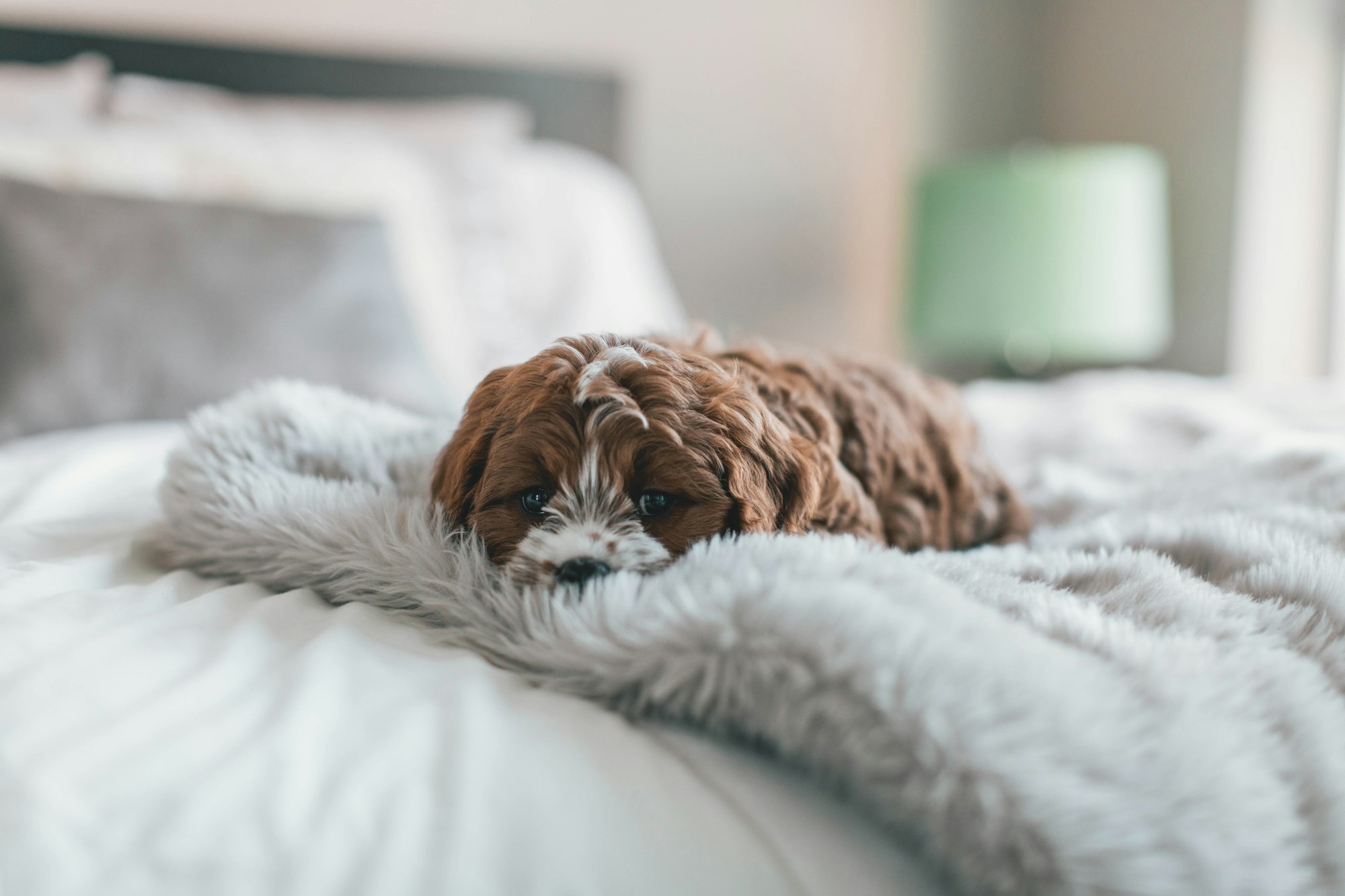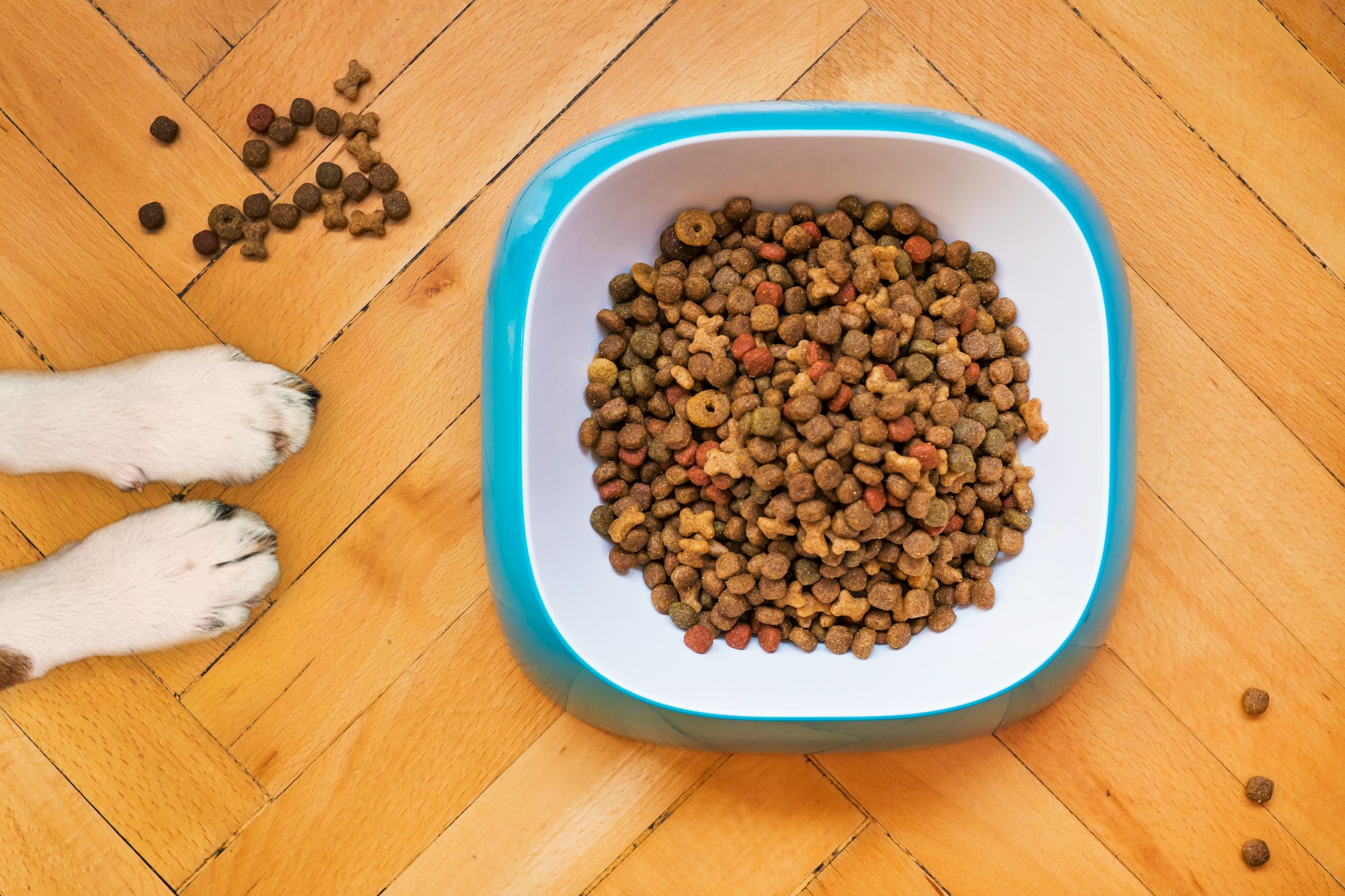Puppies are well-known for their seemingly endless sleeping habits. If you're a new puppy parent, you may wonder why your little furry friend spends so much time snoozing. There are several reasons why puppies sleep a lot, and understanding these factors can help you provide the best care for your adorable bundle of energy. Here are some key reasons why puppies indulge in frequent and extended periods of sleep.

1. Growth and Development: Puppies undergo rapid growth during their early stages of life. Sleeping allows their bodies to allocate energy and resources towards important physiological processes like tissue repair, muscle growth, and bone development.
2. Energy Conservation: Puppies have high energy levels, and sleep helps them recharge and conserve energy for their active bursts of play and exploration. As puppies constantly explore their new environment and engage in playful activities, their bodies need ample rest to replenish their energy stores.
3. Mental and Physical Stimulation: While puppies sleep, their brains continue to process and consolidate newly acquired information and skills. Sleep plays a crucial role in their cognitive and neurological development, allowing them to process experiences, strengthen memory, and develop problem-solving abilities.
4. Health and Well-being: Just like humans, puppies need regular sleep to maintain overall health and well-being. Quality sleep supports a robust immune system, helps regulate hormone levels, and promotes emotional balance. It also contributes to proper digestion and enhances the puppy's ability to cope with stress.

Understanding the reasons behind a puppy's sleeping habits can help you establish a healthy routine and provide a suitable environment for your furry friend. It's essential to offer a comfortable and secure sleeping area, ensure they have regular, healthy meals, and provide engaging activities when they are awake. Remember, puppies need their rest to grow, develop, and become well-adjusted senior dogs.
- Growth and development: Puppies sleep a lot because it's essential for their growth and development. During sleep, their bodies have time to repair and grow, helping them to mature and reach their full potential.
- Energy conservation: Sleeping allows puppies to conserve energy. As they are constantly growing, they require more rest to recharge their bodies and support their active and playful nature during wakeful periods.
- Mental and physical stimulation: Deep sleep in puppies promotes mental and physical stimulation. During sleep, their brains process new information and experiences, strengthening their cognitive abilities and overall well-being.
Why Do Puppies Sleep a Lot?
Puppies, oh how they love their sleep! But have you ever wondered why? In this section, we'll uncover the reasons behind their snooze fest. From growth and development to energy conservation, mental and physical stimulation, and even their health and well-being, we'll explore the various factors that contribute to those adorable, long naps. So, get ready to dive into the fascinating world of puppy slumber and discover why they need all that rest!
Growth and Development
Puppies sleep a lot during their early months for rapid growth and development. Growth and development are crucial for puppies' overall well-being. During sleep, their bodies repair tissues, build muscles, and strengthen their immune system, which is essential for their growth and development. This helps them reach their full potential in size and physical capabilities. Puppies can sleep up to 18-20 hours a day, allowing energy allocation towards these essential processes of growth and development.
Sleep is crucial for brain development, which is an integral part of growth and development in puppies. It facilitates memory consolidation and learning, promoting their cognitive abilities. While puppies sleep, their brains continue to develop and create new neural connections that enhance their overall development, including problem-solving skills.
Puppies' bodies produce growth hormones during sleep that stimulate bone and muscle growth, further supporting their growth and development. These hormones are essential for healthy development and ensure that puppies grow into strong and sturdy dogs.
Proper rest also contributes to puppies' well-being, which is vital for their growth and development. When they get enough sleep, they are more energetic and active while awake. Adequate rest helps regulate mood and behavior, preventing irritability and hyperactivity, thus promoting healthy growth and development.
To support puppies' growth and development, it is essential to provide them with a comfortable and secure sleep environment. This includes a cozy bed or crate, a quiet location, and sufficient warmth. By prioritizing their sleep needs, owners can ensure that puppies have optimal conditions for growth and development. The growth and development of puppies should be given utmost importance for their overall well-being and future health.

Energy Conservation
Puppies engage in sleep as a means to practice energy conservation during their crucial growth and development phase. This restful state allows their bodies to recharge and revitalize, promoting optimal growth. Energy conservation is crucial for puppies since their reserves are limited. By engaging in ample sleep, puppies effectively minimize unnecessary energy expenditure, thereby reserving energy for essential activities such as feeding, playing, and learning.
Sleeping also plays a pivotal role in the overall well-being of puppies. During this period, puppies engage in REM (Rapid Eye Movement) sleep, which is vital for their brain development and learning abilities. REM sleep facilitates the processing and consolidation of information in puppies, thereby enhancing their cognitive prowess.
Puppies require sufficient rest to support their overall health. High-quality sleep not only fosters a robust immune system but also boosts metabolism and facilitates healthy growth.
It is worth noting that puppies have distinct sleep requirements compared to adult dogs. They necessitate more hours of sleep and have shorter periods of wakefulness. Therefore, providing puppies with a comfortable and serene sleeping area is imperative in order to create an environment that promotes rest and recuperation.
Mental and Physical Stimulation
Mental and physical stimulation are vital for the well-being and sleep patterns of puppies. When considering these factors, there are several key elements to keep in mind.
Firstly, interactive playtime is essential. Engaging puppies in activities such as fetch, tug-of-war, and puzzle toys provides the necessary mental and physical stimulation they require.
Secondly, daily exercise is crucial. Whether it's taking them for walks, runs, or letting them play in a dog park, this helps puppies expend energy and stay physically fit.
Thirdly, training sessions play a significant role. Teaching them essential commands and introducing new tricks challenges their minds and provides mental stimulation.
Fourthly, environmental enrichment is important. Even when they are alone, it's essential to stimulate puppies by providing toys, interactive feeders, and puzzle games.
Lastly, socialization is key. Interacting with other puppies and friendly dogs through playdates or puppy socialization classes contributes to both mental and physical stimulation.
By incorporating mental and physical stimulation into a puppy's routine, you prevent boredom, reduce unwanted behaviors, and promote a healthy sleep schedule. Remember to provide a variety of activities based on their specific needs and preferences.

Health and Well-being
When it comes to puppies' health, several factors should be considered. Here are some important points to keep in mind:
- Proper nutrition: Puppies need a balanced diet with high-quality dog food that includes all necessary nutrients for growth and development.
- Regular exercise: Puppies require exercise to maintain good health, strengthen their muscles and bones, and maintain a healthy weight. Walking, playing fetch, and interactive play sessions are great ways to keep them active.
- Easing fear at the vet: Regular visits to the vet are essential for monitoring puppies' health. Vaccinations, deworming, and preventive treatments for parasites are important. Regular check-ups can catch potential health issues early.
- Proper grooming: Regular brushing, nail trimming, and bathing are important for puppies' overall health. It also allows checking for any abnormalities or signs of illness.
- Socialization: Exposing puppies to various environments, people, and animals from a young age ensures they develop into well-adjusted and confident adults. It helps prevent behavioral issues and promotes mental well-being.
- Training and mental stimulation: Providing mental stimulation through training sessions, interactive dog toys, and challenges helps prevent boredom and promotes overall well-being.
By considering these factors and prioritizing your puppy's health, you can ensure they grow up to be happy and healthy companions.
Some Facts About Why Puppies Sleep A Lot:
- ✔ Puppies sleep from 18 to 20 hours a day - This is essential for healthy growth and development. (Source: AKC)
- ✔ Puppies burn a lot of energy when awake - So they may not always pay attention to their internal clock telling them to rest. (Source: AKC)
- ✔ Puppies need 15-20 hours of sleep a day - This sleep aids in their development, and establishing a routine and quiet sleeping spot is important. (Source: Hills Pet)
- ✔ Sleep is important for puppies' growth - Their bones, tissues, and nervous system are constantly changing and developing. (Source: Vet Help Direct)
- ✔ Building a healthy immune system requires a lot of energy - Which is why puppies need to sleep a lot. (Source: Vet Help Direct)
Frequently Asked Questions

Why do puppies sleep a lot during the day?
Puppies sleep a lot during the day because it is essential for their healthy growth and development. They burn a lot of energy when awake, so they may not always pay attention to their internal clock telling them to rest. Creating a quiet and comfortable sleep area and following a schedule of active time followed by quiet time can help puppies get the rest they need.
How much should a young dog sleep?
A young dog, such as a puppy, needs a significant amount of sleep for their balanced development. On average, a young puppy may sleep for 18-20 hours a day. This extensive sleep is crucial for their bones, tissues, and nervous system, which are constantly changing and developing. Sleeping also aids in the absorption of nutrients from their food, supports their mental development, and helps build a healthy immune system.
What are the environmental factors that can affect a dog's sleep patterns?
Several environmental factors can affect a dog's sleep patterns. These include the presence of new pets, hot weather, schedule changes, or increased playtime and exercise. Environmental conditions play a role in a dog's overall health and well-being, so it's important to monitor and provide suitable sleeping arrangements and routines to ensure they get the rest they need.
How can I help my puppy sleep at night?
To help your puppy sleep at night, you can make their crate or designated sleep area appealing by adding comfortable bedding and toys. Establishing a bedtime routine, such as dimming the lights and engaging in calming activities, can signal to your puppy that it's time to sleep. Keeping their sleep area quiet and minimizing interruptions can also promote uninterrupted sleep.
When should I be concerned about my puppy's excessive sleeping?
While puppies naturally require a lot of sleep, excessive sleeping could be a cause for concern if accompanied by lethargy or disconnected behavior when awake. If your puppy is sleeping over 20 hours a day and showing signs of being unusually tired or unresponsive, it is recommended to seek veterinary attention. Excessive sleeping can sometimes indicate underlying health issues that need to be addressed.
What can I do if my fully-grown dog is sleeping more than usual?
If your fully-grown happy dog is sleeping more than the typical 12-14 hours a day, it could be a sign of an underlying health issue. Environmental changes, such as the introduction of new pets or changes in routine, can also affect sleep patterns. It's important to monitor their sleep behaviors and overall health status. If you notice any significant changes, it's best to consult with a veterinarian for proper evaluation and potential medical attention.






